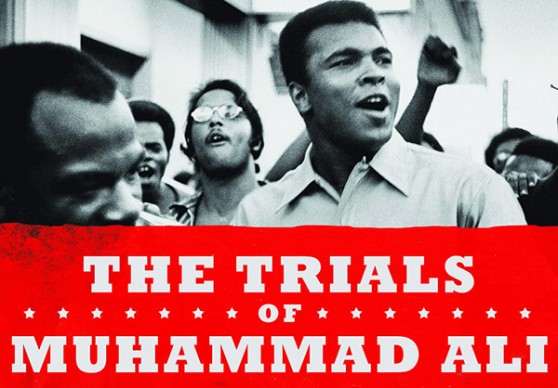The Trials of Muhammad Ali: A fomental institution

Bill Siegel’s The Trials of Muhammad Ali is a riveting hour and a half, and that isn’t surprising given its subject, one of the most charismatic humans ever.
(You can count the other men capable of maintaining an aura of power while wearing a fez on one hand, and you won’t need your thumb, either.) But the film’s real gift is reminding us — without referring to it explicitly until the very end — how much a part of our daily lives Ali was for many years.
Trials begins with David Susskind coating a bygone lens in a figurative spittle of dog-whistle loathing, sneering that Ali is “a simplistic fool and a pawn” (translation: “a too-black black man who’s not being black the way I like it, by which I mean obediently and at a distance”). We transition to footage of Ali receiving the Medal of Freedom from George W. Bush — paler, frailer, safe to honor because he’s no longer quite so dangerous — and then back to the sixties, to Ali’s move away from his slave name, to the draft limbo that’s the central story. It’s a smart way to point up the contrast between how many of us think of Ali now, a gentled icon who’s receded somewhat behind his myth over the last ten or fifteen years, and even the Ali I remember from childhood, a decade after the draft fight happened. He was…around. He came every day, like the mail. Trials brings the viewer (back) to that time so skillfully, mixing footage and headlines and Vietnamese anti-American propaganda cards (I would watch an entire docu just on political art of that time, by the way — that one placard with the lynching painted on the African-American GI’s helmet is a novel). His daughter Hana has a line about not wanting him to go out of town, and complaining, “You’re not my daddy, you’re Muhammad Ali,” and it’s how I related to him as a child myself, strangely — I didn’t know what he did, but I knew who he was. And so much of what Ali did was being who he was.
I’d have liked to spend less time with Ali’s brother Rahaman, who tends to drag the story a little bit into the territory of the hagiographies we already have, and more on the legalities of the draft-board case; it’s explained well, but seems like something of an afterthought given the time devoted to schisms among the Black Muslim leadership. (And talking about charisma — I forget what an amazing, compelling voice Malcolm X had. Not the power of his words, though obviously that; I mean his literal physical voice, that confident and weirdly relaxing baritone. Trials is very much about figurative voices and selves, and at the same time I kept noticing audible timbres. Realizing that Minister Farrakhan, in both register and rhythm of his stories, reminded me of Buck O’Neil was pretty bizarre and sort of delightful…and then a snippet of Jackie Robinson and his mismatched Muppety honk. Of all the people in the world to sound like a freshman-bio teacher with chalk on his ass.) I get the sense that the movie Siegel set out to make ended up consigned to the last ten minutes, to a degree — to the Life-mag-style photo composite at the end and the valedictory “so many ways of looking at him that have nothing to do with him” quotation. And that’s a good thing; the ending kind of backs off the plate a little bit, after an assured telling of a fraught few years, and closes with Hi-8 footage of Ali walking by himself.
The rest of the film is so good, though, such a visual page-turner. It lets you “remember” things that happened when you were but an egg; it makes you want to learn more about those things. An effortless sit, excellent but modest editing, and not really about the boxing if that’s something you find dull.
Tags: Bill Siegel Buck O'Neil David Susskind George W. Bush Hana Ali Jackie Robinson Louis Farrakhan Malcolm X Muhammad Ali Rahaman Ali





The thing I remember as a kid was that he had a cartoon on Saturday mornings AND was on NBC’s Wide World of Sports at noon, now that’s cultural clout!
This is definitely a must-see for me. I went on a boxing doc/biography binge last winter, and this has been on my list for quite a while.
If you’re still in an Ali mood, check out Sound and Fury: Two Powerful Lives, One Fateful Friendship by David Kindred. It spends a lot of time on the trials, among other Ali controversies, and how he and Howard Cosell worked together to project an image in an obviously volatile time for a brash black man to be drawing attention to himself in public.